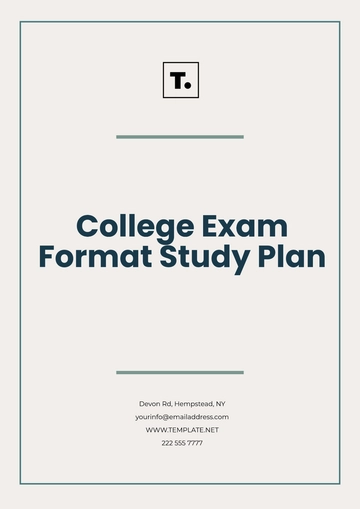Free Science Subject Study Plan

Objective: To prepare for upcoming exams in science subjects by organizing the study schedule, setting specific goals for each topic, and reviewing concepts regularly.
Study Plan Duration:
Start Date: [Enter Date]
End Date: [Enter Date]
I. Study Goals
Master the Basics: Ensure a clear understanding of fundamental concepts in physics, chemistry, and biology.
Practice Problem-Solving: Focus on applying theories through exercises and experiments, particularly in Physics and Chemistry.
Review past papers: familiarize yourself with exam formats, time management, and common question types.
Conduct Experiments (if applicable): Organize time for any lab work or hands-on activities that reinforce theoretical knowledge.
II. Weekly Breakdown
Week | Physics | Chemistry | Biology |
|---|---|---|---|
Week 1 | Study Newton’s Laws, Kinematics | Review Atomic Structure, Periodic Table | Study Cell Structure and Function |
Week 2 | Work on Force & Motion, Energy | Study Chemical Bonds and Reactions | Learn about Photosynthesis and Respiration |
Week 3 | Study Heat, Thermodynamics | Focus on Organic Chemistry (Hydrocarbons) | Study Genetics and Evolution |
Week 4 | Work on Waves, Optics | Review Acids, Bases, and pH | Study Ecology and Ecosystems |
III. Daily Schedule
Time | Activity |
|---|---|
6:00 AM - 7:00 AM | Review notes from the previous day |
7:00 AM - 9:00 AM | Study one subject in-depth (alternate between Physics, Chemistry, and Biology) |
9:00 AM - 9:30 AM | Break |
9:30 AM - 12:00 PM | Practice problems, quizzes, or lab work |
12:00 PM - 1:00 PM | Lunch |
1:00 PM - 3:00 PM | Continue studying (use videos, notes, or textbooks for support) |
3:00 PM - 4:00 PM | Review key concepts; take a mock quiz |
4:00 PM - 5:00 PM | Take a break, engage in a light activity or relax |
5:00 PM - 6:00 PM | Review progress and plan for the next day |
IV. Study Techniques
Active recall: Regularly quiz yourself on key concepts to boost retention.
Spaced Repetition: Use flashcards for frequent reviews of important facts and terms.
Mind Mapping: Draw diagrams to connect concepts for better understanding.
Practice Papers: Solve past papers under timed conditions to improve speed and accuracy.
Group Study (if possible): Discuss difficult topics with peers to gain different perspectives.
V. Evaluation and Adjustment
Weekly Review: At the end of each week, review the goals and assess progress. Adjust the plan as necessary to focus on weaker areas.
Mock Tests: Take one mock test per week for each subject to monitor improvement.
Rest and Recovery: Ensure regular breaks and sufficient rest to avoid burnout.
- 100% Customizable, free editor
- Access 1 Million+ Templates, photo’s & graphics
- Download or share as a template
- Click and replace photos, graphics, text, backgrounds
- Resize, crop, AI write & more
- Access advanced editor
The Science Subject Study Plan Template, offered by Template.net, is the perfect tool to structure your learning journey. This customizable and printable template is designed to keep your studies organized and effective. Easily downloadable and editable in our AI Editor Tool, it allows you to tailor your study plan to fit your unique goals and schedule. Get ready to excel in your science subjects with this essential resource!





























